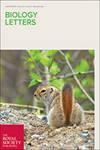Addictive manipulation: a perspective on the role of reproductive parasitism in the evolution of bacteria-eukaryote symbioses.
IF 2.8
2区 生物学
Q2 BIOLOGY
引用次数: 0
Abstract
Wolbachia bacteria encompass noteworthy reproductive manipulators of their arthropod hosts. which influence host reproduction to favour their own transmission, also exploiting toxin-antitoxin systems. Recently, multiple other bacterial symbionts of arthropods have been shown to display comparable manipulative capabilities. Here, we wonder whether such phenomena are truly restricted to arthropod hosts. We focused on protists, primary models for evolutionary investigations on eukaryotes due to their diversity and antiquity, but still overall under-investigated. After a thorough re-examination of the literature on bacterial-protist interactions with this question in mind, we conclude that such bacterial 'addictive manipulators' of protists do exist, are probably widespread, and have been overlooked until now as a consequence of the fact that investigations are commonly host-centred, thus ineffective to detect such behaviour. Additionally, we posit that toxin-antitoxin systems are crucial in these phenomena of addictive manipulation of protists, as a result of recurrent evolutionary repurposing. This indicates intriguing functional analogy and molecular homology with plasmid-bacterial interplays. Finally, we remark that multiple addictive manipulators are affiliated with specific bacterial lineages with ancient associations with diverse eukaryotes. This suggests a possible role of addictive manipulation of protists in paving the way to the evolution of bacteria associated with multicellular organisms.上瘾的操纵:从生殖寄生在细菌-真核共生进化中的作用的角度。
沃尔巴克氏菌是节肢动物宿主值得注意的繁殖操纵者,它影响宿主的繁殖以利于自身传播,还利用毒素-抗毒素系统。最近,节肢动物的其他多种细菌共生体也显示出类似的操纵能力。在这里,我们想知道这种现象是否真的仅限于节肢动物宿主。我们将重点放在原生动物上,由于其多样性和古老性,原生动物是研究真核生物进化的主要模型,但总体研究仍然不足。带着这个问题,我们对有关细菌与原生动物相互作用的文献进行了彻底的重新研究,得出的结论是,原生动物的这种细菌 "上瘾操纵者 "确实存在,而且很可能很普遍,但由于研究通常以宿主为中心,因此迄今为止一直被忽视,无法有效地发现这种行为。此外,我们认为毒素-抗毒素系统在这些操纵原生动物上瘾的现象中至关重要,这是反复进化的结果。这表明,质粒与细菌之间的相互作用存在着有趣的功能类比和分子同源性。最后,我们注意到,多种上瘾操纵因子与特定的细菌谱系有关,并与不同的真核生物有着古老的联系。这表明原生生物的成瘾性操纵可能为细菌与多细胞生物的进化铺平了道路。
本文章由计算机程序翻译,如有差异,请以英文原文为准。
求助全文
约1分钟内获得全文
求助全文
来源期刊

Biology Letters
生物-进化生物学
CiteScore
5.50
自引率
3.00%
发文量
164
审稿时长
1.0 months
期刊介绍:
Previously a supplement to Proceedings B, and launched as an independent journal in 2005, Biology Letters is a primarily online, peer-reviewed journal that publishes short, high-quality articles, reviews and opinion pieces from across the biological sciences. The scope of Biology Letters is vast - publishing high-quality research in any area of the biological sciences. However, we have particular strengths in the biology, evolution and ecology of whole organisms. We also publish in other areas of biology, such as molecular ecology and evolution, environmental science, and phylogenetics.
 求助内容:
求助内容: 应助结果提醒方式:
应助结果提醒方式:


